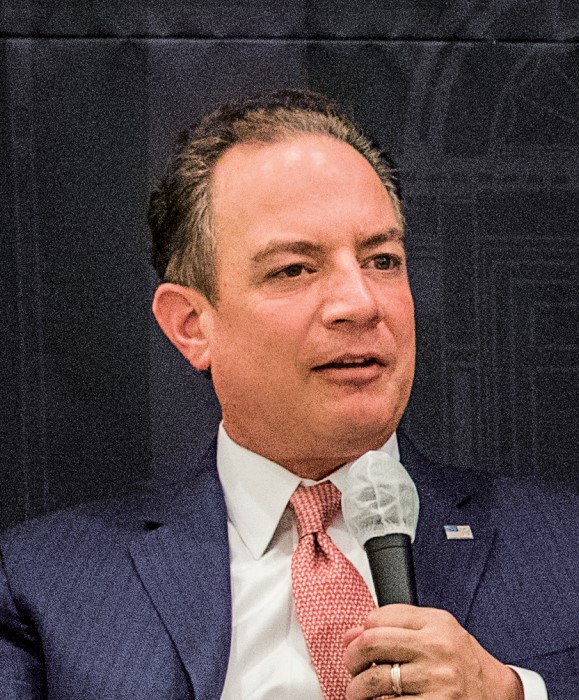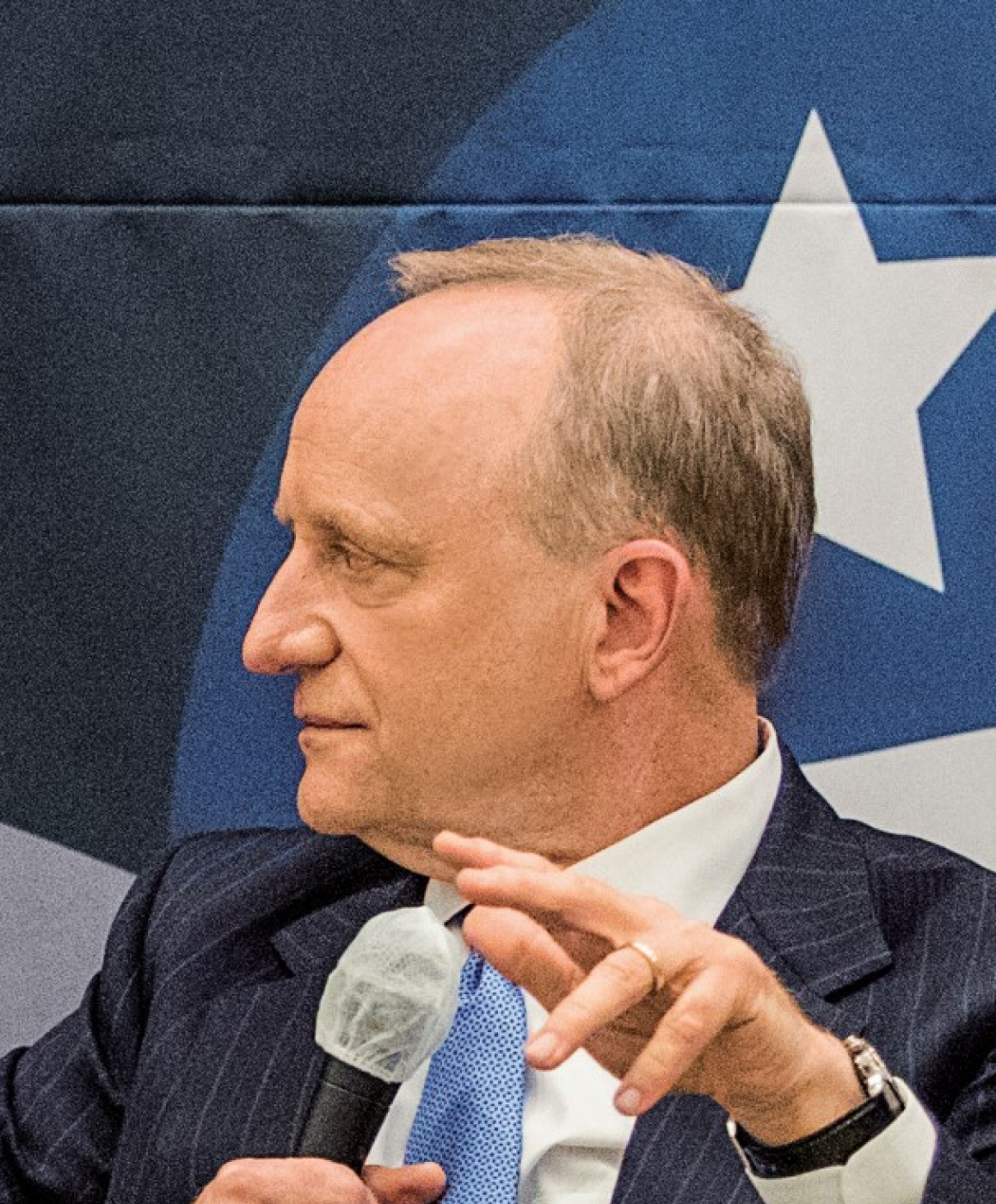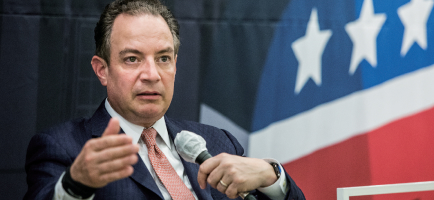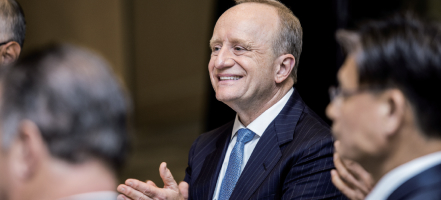in Focus
The 2024 U.S. Presidential Election
Capturing Global Attention
The Impact of the U.S. Presidential Election on the Korean Economy
In the run-up to the U.S. presidential election, a fireside chat was held on the topic of ‘Outlook on the 2024 U.S. Election’ to help South Korean business leaders gain a clearer understanding of the U.S. election landscape and explore effective response strategies. We invited Mr. Reince Priebus, former Chief of Staff in the Trump administration, and Mr. Paul Begala, former White House Counselor, to discuss the two candidates’ policies on advanced industries and energy, as well as how South Korean companies should respond.
Photographer Kyu-yeol Lee

Reince Priebus
- Chairman of the Host Committee for the Republican National Convention in Milwaukee (2024)
- U.S. Navy Reserve, Commissioned as an Ensign (2019)
- First White House Chief of Staff under the Trump Administration (2017)
- Chair of the Republican National Committee (RNC)
- Chair of the Republican Party of Wisconsin (2007-2011)

Paul Begala
- CNN Political Contributor
- Advisor to the Obama Administration’s Re-Election Campaign (2012)
- Counselor in the Clinton Administration (1997-1999)
- Chief Strategist for the Clinton Campaign (1992)
Q. What are the key insights from the current national polls and battleground states, and the notable variables that could determine the outcome of the U.S. presidential election?
Reince Priebus The most recent polling shows that this race is incredibly close. More importantly, it’s tied in all battleground states. This election can be decided in 6 or 7 states.1 It is almost like we don’t have a national election in the United States; we have an election in six states, maybe seven. You are trying to spend six billion dollars to get voters from seven states to move one way or the other. Anything from what beer they drink to how many kids they have, how much money they make, and how they are paying their mortgage can be tied to data and the messaging of the party. I believe this will be the biggest determinant of this election.
Paul Begala Biden collapsed in the last debate. However, the Democratic Party decided not to be a cult of personality, while Republicans simply revolve around Trump. Rather, the Democrats decided to win through solidarity as a political party and believe that Harris can win. Seventy-five percent of Americans want change. In life, there are only two options: to stay the course, or pursue the change. And who would that “change” be? Is it the guy who has been running for elections non-stop for ten years, or the woman who has been part of the administration that people are unhappy with? I think it’s going to be an interesting contest.
Q. You’ve already mentioned the importance of battleground states, but could you elaborate more on that?
Reince Priebus The Sun Belt area, which includes states like Arizona and Nevada, is a little bit different and tricky. While they have a large Hispanic population, it doesn’t necessarily fall into the same voting patterns that Hispanics in Pennsylvania, Wisconsin, or Michigan would follow. The Sun Belt states as well as Southern states of North Carolina and Georgia should be for Trump, but they are still within the margin of error. Sometimes Harris leads, and sometimes she falls behind. This is one of the reasons why Harris wants to win against Trump in Georgia. This would throw off all of the calculations of President Trump on what he needs to do in order to win. Georgia is crucial due to its large black voter base. President Trump does much better with black voters in Georgia than he does in Wisconsin, Michigan and Pennsylvania, whatever the reasons are. The reality from our point of view is that there are three issues that matter: the economy, inflation and immigration. Inflation is related to things like how much a gallon of gas costs; how much do eggs cost; and how much does bacon cost. Those issues will drive this election.
Paul Begala There have been more events and variables in this election than has ever been seen before. In his first election against Hillary, Trump garnered 45.9% of the vote, and this increased by 1%p to 46.9% in his second election against Biden. Trump’s support rate has fluctuated within a narrow range. In contrast, Harris’s support rate fluctuates more, which means that she has a high ceiling and a low floor. Pennsylvania has nineteen electoral college votes. That’s why this state is the most important. But at the end of the day, its voters watch political news four minutes a week, yet they get to pick the president of the United States. This is why we are spending more money there as well.

Q. Not only in Korea and the U.S., but globally, companies are investing in advanced industries through legislation like the CHIPS Act. This law has been in effect for two years, serving as an essential pillar of Bidenomics. How do you think this legislative environment will change depending on each candidate?
Reince Priebus I think both candidates will continue to advance these types of legislation that are related to technology and the advancement of American companies. Whether it be the CHIPS Act or other laws on different kinds of superconductors, the space industry or digital currency, all of these are on the American policy agenda, and are not shortterm issues. Another point to note is that America is becoming less reliant on foreign technologies. This will create opportunities for those present here. What I want to say is, don’t wait around for the legislative process in America to tell you what the cooperative framework is going to look like. You need to be active and vocal in finding ways to collaborate before the policy outlines are presented. Don’t wait for Harris or Trump to make decisions for you on how you are going to operate. The CHIPS Act is going to continue. I think innovative grant type opportunities will increase in the United States.
Q. What we are most concerned about is that Trump has been criticizing the Inflation Reduction Act. Whether this will continue or not seems like a big issue.
Reince Priebus I believe that the IRA creates inflation rather than reducing it, and that we should scale back a large part of the act. In the IRA, there are projects that have nothing to do with inflation, so there will be things that will continue and some other things that won’t. If elected, I believe Trump would go through the act and see what parts should be continued.
Paul Begala I believe Harris will generally stay on board with Biden when it comes to the CHIPS Act and related projects. Trump can be seen as a sort of brand: he thinks that if a policy has someone else’s brand on it, it must be scrapped. The reason he wanted to kill Obamacare is that it was called Obamacare. I think the same would apply to the CHIPS Act and the Inflation Reduction Act.
Q. How do you think Harris will try to distance herself from Biden?
Paul Begala Harris should emphasize that Trump has to be the past, and so should Biden. She has already been doing a good job. Biden wanted to tax capital gains at 39.6%, but Harris has said 28%. While this is still an increase from the current 20%, it’s a much more moderate position.
Q. One area where the two candidates are very starkly different is energy. Harris seemed to focus on promoting clean energy development when it comes to energy policies. How do you think the energy landscape will be shaped if Harris wins the election?
Paul Begala There are two aspects: substance and messaging. The U.S. drills more oil today than when Trump was president, with 12 million barrels a day. It was 11 million barrels under the Trump administration. I think the Democrats are scared and embarrassed about this. Harris has shifted her stance on fracking.2 She is showing strategic ambiguity, which seems to be something she has learned and adopted from the White House. The approach should be pragmatic, embracing both oil and alternative energy.
Reince Priebus Wind energy increased from 2017 to 2021, and so did battery production. If you are in Wisconsin and you are having a hard time putting a full tank of gas in your car, would you rather vote for the candidate who talks about lowering electricity bills through government-subsidized wind power generation, or for the candidate who says, “Renewable energy is only a one-off deal. I am going to drill more oil, so that you can go back to paying $1.80 a gallon”? We will find out in this election.

Q. If we are to have an in-depth discussion on the economic policies of the candidates, China takes up a large part. Could you first talk about Trump’s economic policies vis-à-vis China?
Reince Priebus You will be able to see what you saw before COVID right away if Trump takes office. I believe his second term will continue in the same policy directions, but stronger. They will expand into other technologies beyond steel and aluminum. In terms of taxes, I believe he will focus again on reciprocal tax.3 However, actual implementation of the tax will be difficult, because the opinions of United States Trade Representative (USTR) and the trade committees of the House and the Senate will also influence the process. So I think Trump will implement as many policies as he can through executive orders.
Paul Begala To get the facts straight, taxes are set by Congress, but tariffs are set by the President. The President of the U.S. has vast power to impose tariffs. Trump wants a 100% tariff on every product from China, and a 10% tariff on every product from Korea, Mexico, France, and every country on Earth. Trump can and is likely to do so. Trump said in a speech at the Economic Club of New York that he wants a fiscal system from the days when William McKinley was the president. William McKinley, who died in 1901, built a tax system with no income tax and funded the entire government by tariffs. This would mean a sales tax of $4,000 for each household. Meanwhile, the income tax for billionaires would go to zero. In terms of tariffs, Trump can do what he wants on his first day.
Q. As opposed to that, what do you think Harris is going to do?
Paul Begala I don’t think Harris is for huge tariffs. When it comes to China, National Security Advisor Jake Sullivan supports the ‘Small Yard, High Fence’ strategy. This strategy particularly targets sensitive sectors such as biopharmaceutical and semiconductor industries.
Reince Priebus One of the things to keep in mind is that Republicans and Democrats generally agree on China-related issues. Both parties see the need to address China-related issues, Be it tariffs or taxes, however they are sliced, both parties believe confronting China should be part of their agenda.
Q. The two candidates present vastly different approaches when it comes to North Korean policies. What’s going to happen to these policies depending on who wins the White House in November?
Reince Priebus We are living in a different world than we were a few years ago, before Russia invaded Ukraine and before North Korea became outwardly involved with Russia, China and Iran. I don’t think Trump’s approach to North Korea is going to be the same if he takes office again. The position and approach taken by the current U.S. government will not work, so it’s silly to stay the course. Something needs to be changed when it comes to North Korea’s obsession with nuclear weapons.
Paul Begala During her visit to the demilitarized zone in Korea, Harris described it as the line between good and evil. It’s not that the people there are evil; what’s evil is the system. It’s embarrassing for Trump to be unclear about his stance, saying that he was in love with Kim Jong Un and sent him love letters.
Reince Priebus Paul Begala is saying that Harris defines North Korea’s system as evil and squarely faces it, but both parties have been doing the same thing so far. We have been repeating the same game for a long time, and nothing has actually changed. If anything, it’s gotten worse.
Q. Do you have any other comments for Korean companies?
Reince Priebus Whether it’s Harris, Trump, or anyone else, it’s important to get involved in issues you are concerned with. Waiting around will not get you anything.
Paul Begala If I could add, there are four Korean Americans in the U.S. House of Representatives. Two are Democrats, and the other two are Republicans. Democrat Congressman Andy Kim is running to represent New Jersey in the U.S. Senate. I think this is something to build on and grow as well, to effectively voice your opinions.
Q. Any final messages before we wrap up?
Reince Priebus Thank you for taking an interest in what’s happening in the U.S. political system. We care about you, too, and we respect the people of South Korea. What you have built here is amazing. We respect it, and we look forward to continuing our friendship.
Paul Begala I want to thank you for being an ally to America. Thank you for being with us militarily, diplomatically, and economically. I think what you have done in this country over the last 60 years is the most impressive story in the world. Having a strong, stable, wealthy, and smart ally in one of the most dangerous places in the world is a huge asset to Americans.
- 1. 7 swing states: Wisconsin, Pennsylvania, Michigan, Arizona, Georgia, Nevada, and North Carolina.
- 2. Hydraulic fracturing: Harris initially advocated for a ban on hydraulic fracturing due to environmental concerns (issues such as drinking water and groundwater contamination) but later shifted her position.
- 3. A tax imposed on imported goods from other countries, equal to the taxes placed on the same American products by those countries, which functions as a tariff by raising the price of imported goods.
